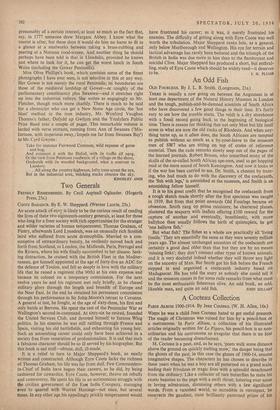Two Generals
COOTE BAHADUR. By E. W. Sheppard. (Werner Laurie, 25s.) AN acute attack of ettr; is likely to be the curious result of reading the lives of these two eighteenth-century generals, at least for those who long for a freer society with rich opportunities for the stranger and wilder varieties of human temperament. Thomas Graham, of Fintry, afterwards Lord Lynedoch, was an unusually rich Scottish laird who suffered from acute dromophilia. Married to a con- sumptive of extraordinary beauty, he restlessly moved back and forth from Scotland, to London, the Midlands, Paris, Portugal and the Riviera, where his wife finally succumbed to her disease. Seek- ing distraction, he cruised with the British Fleet in the Mediter- ranean, got himself appointed at the age of forty-five an ADC for the defence of Toulon, and fell so deeply in love with the military life that he raised a regiment (the 90th) at his own expense and became its colonel on a temporary commission. For the next twelve years he and his regiment met only briefly, as he chased military glory through the length and breadth of Europe and the Near East. In the end he obtained his permanent commission through his performance in Sir John Moore's retreat to Corunna. A general at last, he fought, at the age of sixty-three, his first and only battle at Barrosa. He spent the rest of the Peninsular War as Wellington's second-in-command. At sixty-six he retired, founded the United Services Club, and devoted himself to 'furious Whig politics. In his nineties he was still rattling through France and Spain, visiting his old battlefields, and exhausting his young heir. Such an astonishing career could only have been achieved in a society free from veneration of professionalism. It is sad that such a fabulous character should be so ill served by his biographer. But this book is sad stuff—obtuse, dull, ill-made.
It is a relief to turn to Major Sheppard's book, so neatly written and constructed. Although Eyre Coote lacks the richness of Thomas Graham, his life was far from dull. Few Commanders- in-Chief of India have begun their careers, as he did, by being cashiered for cowardice. Eyre Coote, however, throve on rebuffs and controversy. He spent his life in an acrimonious struggle with the civilian government of the East India Company, managing even to quarrel with Warren Hastings—not once, but several times. In any other age his appallingly prickly temperament would
have frustrated his career; as it was, it merely frustrated his enemies. The difficulty of getting along with Eyre Coote was well worth the tribulation. Major Sheppard ranks him, as a general, only below Marlborough and Wellington. His eye for terrain and tactical advantage has rarely been bettered and the triumph of the British in India was due more to him than to the flamboyant and suicidal Clive. Major Sheppard has produced a short, but enthral- ling, study of Eyre Coote which should be widely read—it deserves


















































 Previous page
Previous page